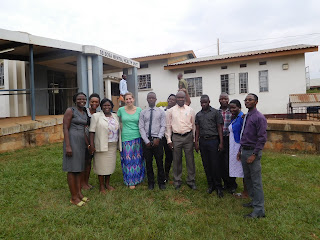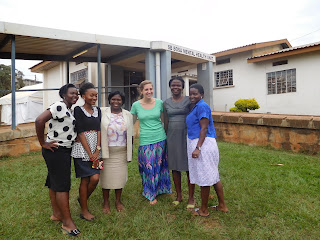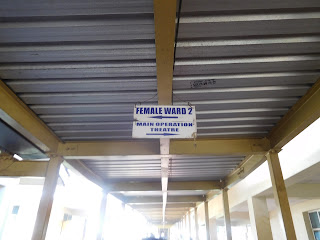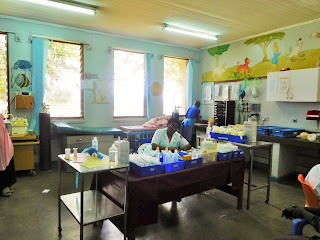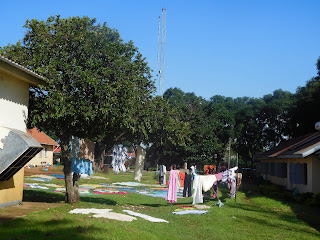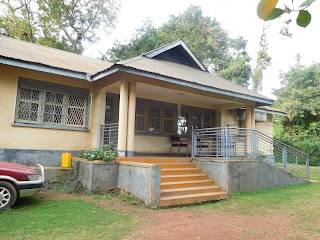 |
| My front porch for the next few weeks! |
What a good feeling it is to settle in a place knowing you
won’t have to repack and move again for some time! After spending 2 weeks
bouncing from guest house to guest house, I have finally unpacked my bags in
the Mulago Guest House. “Home” for the duration of my time here, I’m quite
content. It is a big guest house with 6 rooms, two beds in most, and there are
two other buildings for visitors. Door to door, it is about a 10 minute walk to
the hospital office where I work. There’s a little café and a restaurant on the
guest house grounds for when I don't feel like making dinner. If I take a left out my drive, instead of a right towards
the hospital, there are many people selling bananas, mangos, g-nuts and other
things, so that is a quick and affordable place to grab a snack. For
comfort and exercise, it’s about a 20 minute walk to the nearest coffee shop
with wifi.
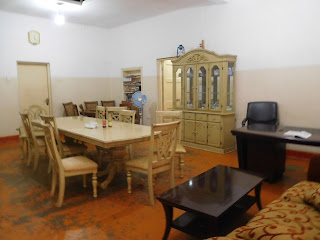 |
| The common area, the kitchen where I make dinner is just through door on the left. |
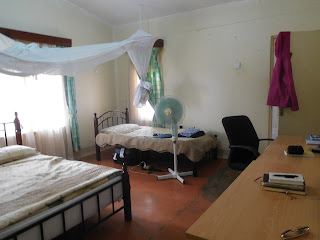 |
| My room! |
The majority of my time so far, I’ve been the only guest.
There were 3 anesthesiologists my first night, 5 students for one night a few
days later, and a young family just moved in for the week. People have been
coming and going, not staying for very long, but I have been able to make friends
with many of the people who work here, making it a little less quiet when I’m
the only one around. Sarah is the woman who makes me breakfast every morning and who I
spend the most time with. I gotta say, fresh fruit, juice squeezed that morning,
Ugandan tea, eggs to order, avocado, she is a great cook and successfully sends
me to work with a satisfied tummy every morning. I went with Sarah to the
Wandegaya Market the other night to get food for the next morning and that was
definitely an adventure! We walked there as the sun was setting, which means it
was completely dark on return, my first night out in Kampala! That’s one thing
about Uganda nights, there is very little dusk. Sunshine to pitch dark. Because
it was dark and our arms were full of groceries we took a taxi back
to the guest house.
My first time in a Ugandan taxi deserves a special explanation. I don’t know about
you, but when I think of a taxi, I think of New York streets full of yellow
cars taxing 1 or 2 people around. In Uganda, taxis are large vans that have a
licensed maximum of “14” passengers. Yes, 14 is in quotes, because many drivers
don’t remember that number if it means they can get a few extra shillings. Oh
and it only costs 500 shillings, no matter the length of the trip (from my
understanding). $1 US is equivalent to approximately 2,900 UGX. If my math is
correct, that made my taxi trip under 25 US cents. No complaints from me.
Some other friends I’ve made are the animals that often make
me feel I’m at the zoo. The turkeys usually wake me up in the morning, they’re
louder than the roosters. The hawks and black and white crows stay mostly to
the trees out front and are usually pretty active in the evening when I come
home from work. Little lizards are common. One that I’ve named Fred, is
particularly fond of my bathroom walls and curtains. We have an agreement that
he can stick around and eat all the mosquitoes he wants, so long as he stays
out of my bedding and clothes. My rarer animal visitors are the monkeys, I’ve
only seen them one morning so far. They were so fun and cute! At first. I
stepped onto the porch and saw them in the bushes and trees, so naturally I
took some pictures. Then the babies ran onto the porch posing for pictures,
cute. Then the moms came. Not so cute. The sneaky babies were distracting me
while the moms tried to get in my backpack and then in the house! Sarah was
still here, thankfully, and she came and shooed them and made sure I could
leave the house without getting attacked by the monkeys. She warned me to be
careful, for as cute as the little ones can be, the bigger ones can be dangerous.
As we were walking around the house we saw about 7 more, so I think there were
at least 15 around our house that morning!
 |
| Fred chilling in the bathroom. |
 |
| I call them Tom and Jerry because they always seem to be chasing each other around. |
 |
| Monkeys in the distance. |
 |
| Babies up close. |
 |
| They were pretty curious of me. |
Overall, it really is a nice place to settle and call home
for the next few weeks. I feel truly blessed to be surrounded by such beauty
and friendly people. It can be hard to be alone sometimes, especially in a foreign
country, but I’m learning to value the quiet time as well as putting myself out there to make friends. It's not always easy for the introvert in me, but the friendships I've already started to make are already showing me it's worth it. Taking a small step of kindness can go a long way to make a friend.

